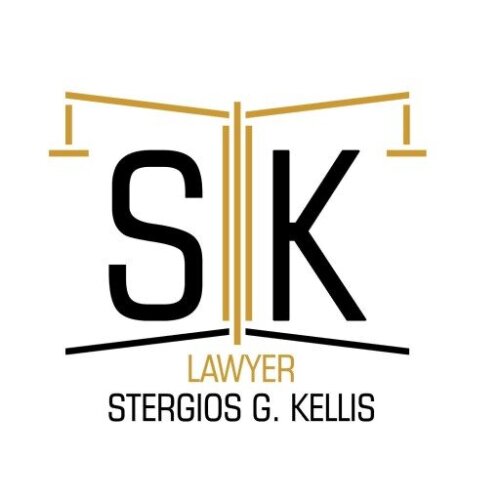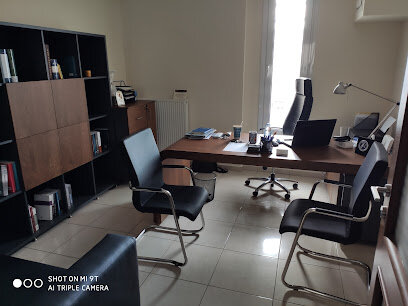Best ADR Mediation & Arbitration Lawyers in Xanthi
Share your needs with us, get contacted by law firms.
Free. Takes 2 min.
List of the best lawyers in Xanthi, Greece
About ADR Mediation & Arbitration Law in Xanthi, Greece
Alternative dispute resolution - ADR - refers to ways of resolving disputes outside the regular court process. The two main ADR methods are mediation and arbitration. Mediation is a voluntary, confidential negotiation process guided by a neutral third party - the mediator - who helps the parties reach a mutually acceptable settlement. Arbitration is a private adjudication where a neutral arbitrator or tribunal decides the dispute and issues an award that, in most cases, is final and enforceable.
In Greece, mediation and arbitration are well-established routes for civil and commercial disputes. National legislation implements European rules on mediation and creates a framework for recognized mediators and mediation procedures. Arbitration is governed by national procedural rules and by international conventions that Greece has ratified, making arbitration awards enforceable both domestically and internationally in most cases.
Xanthi, as a regional centre in northeastern Greece, has access to local ADR resources such as mediators, private arbitration bodies, and lawyers experienced in ADR. Local courts retain certain supervisory roles - for example on the enforcement of settlements and awards - but they will often encourage or allow ADR to resolve disputes faster and with less formality than litigation.
Why You May Need a Lawyer
Choosing ADR instead of litigation can save time and cost, but legal advice remains important in many situations. A lawyer can help you decide whether mediation or arbitration is the best path for your dispute, protect your rights during the process, and make sure any agreement or award is enforceable. Common situations where people seek legal help include:
- Commercial contract disputes between local businesses, including breaches, interpretation issues, or delivery and payment claims.
- Construction and property disputes - including contractor claims, defects, payment disputes, and boundary conflicts.
- Employment disputes - wage claims, unfair dismissal issues, and disputes regarding employment contract terms.
- Family-related or inheritance disputes where parties prefer a private, less adversarial route than court.
- Consumer disputes, especially when cross-border elements or complex liability questions are involved.
- Cross-border disputes that raise questions about jurisdiction, applicable law, and enforcement of outcomes abroad.
- Situations where confidentiality is important - ADR can often provide stronger privacy protections than court hearings.
In all these scenarios a lawyer experienced in ADR can review contracts for arbitration clauses, prepare your case for mediation, draft settlement agreements, advise on how an arbitral award can be enforced, and represent you during hearings or enforcement proceedings in Xanthi courts if required.
Local Laws Overview
Mediation in Greece is regulated by national legislation implementing the EU Mediation Directive. The law sets out general principles including voluntary participation, confidentiality, the role and duties of mediators, and the procedural effect of settlements reached through mediation. Registered mediators are typically required to meet certain qualifications, and there are public and private mediation providers.
Arbitration is governed by Greek procedural law and public policy rules that determine how arbitration agreements are treated, how arbitral proceedings may be conducted, and how awards are enforced or challenged. Greece is a party to the 1958 New York Convention on the recognition and enforcement of foreign arbitral awards, which facilitates cross-border enforcement of arbitral awards.
Key practical points under local law you should know:
- Enforceability - Settlement agreements reached in mediation can be recorded as court-approved deeds or contracts and enforced like any other agreement. Arbitration awards are generally final and enforceable by the courts, subject to limited grounds for challenge.
- Court involvement - Courts in Xanthi may be asked to assist in enforcing settlements or awards, to grant interim measures connected to arbitration, and to hear motions to set aside arbitral awards where statutory grounds exist.
- Confidentiality - Mediation is typically confidential under the legislative framework, but confidentiality may be subject to exceptions - for example when criminal conduct is involved or when disclosure is required by law.
- Competence and scope - Certain matters may be excluded from arbitration or mediation by law, for example some family law issues, criminal matters, or public administrative decisions. Whether a matter is arbitrable or suitable for mediation depends on the subject, the parties, and the applicable law.
- Contracts and clauses - Contracts often include arbitration clauses that determine the seat, language, governing law, number of arbitrators, and institutional rules. The clause will strongly affect how and where disputes are resolved.
Frequently Asked Questions
What is the main difference between mediation and arbitration?
Mediation is a facilitated negotiation in which the mediator helps the parties reach a mutually acceptable settlement. The mediator does not impose a decision. Arbitration is a private adjudication where an arbitrator or panel hears evidence and issues a binding award. Mediation gives parties control over the outcome; arbitration gives a private final decision similar to a court judgment.
Is mediation binding in Greece?
Mediation itself is voluntary and not binding unless the parties reach and sign a settlement agreement. Once signed, that agreement is legally binding and can be enforced as a contract or in some cases as a court-approved deed. The enforceability depends on proper documentation and compliance with formalities.
Are arbitration awards enforceable in Greece and abroad?
Yes. Domestic arbitration awards can be enforced through Greek courts. Foreign and domestic arbitral awards are generally enforceable under national law and international treaties such as the New York Convention, which Greece has ratified. Enforcement may be refused only on limited statutory grounds like public policy conflicts or lack of arbitration agreement.
Do I need a lawyer for mediation or arbitration?
You do not strictly need a lawyer to participate, but legal advice is strongly recommended. A lawyer can help assess legal risks, prepare submissions, advise on settlement options, draft enforceable settlement terms, and represent you at arbitration hearings or in enforcement proceedings.
How long does ADR usually take in Xanthi?
Timeframes vary. Mediation can often be completed in a few sessions over weeks to a few months. Arbitration is typically faster than court litigation but can take several months to a year or more depending on complexity, number of parties, and procedural arrangements. Local availability of qualified arbitrators and mediators affects timing.
How much does ADR cost compared with going to court?
Costs depend on the method, the complexity of the dispute, and selected practitioners. Mediation fees are usually lower than arbitration or litigation. Arbitration involves arbitrator fees, administrative fees if an institution is used, and legal fees, but it often remains less expensive than lengthy court litigation. Ask prospective representatives for fee estimates and cost budgets.
How do I find a qualified mediator or arbitrator in Xanthi?
Start by contacting the Xanthi Bar Association for referrals to lawyers and mediators experienced in ADR. You can also consult national or regional mediator registries and private ADR providers. Make sure the mediator or arbitrator has relevant subject-matter experience and appropriate qualifications or registration under Greek law.
Can I include an arbitration clause in a contract that names Xanthi courts?
Yes, parties are free to agree on dispute resolution procedures. An arbitration clause can specify rules, seat, language, and arbitrators. If you later need to enforce an award or have the courts support interim measures, the chosen seat and clause wording will affect court involvement. Seek legal advice when drafting an arbitration clause to avoid unintended jurisdictional issues.
What happens if one party refuses to take part in mediation or arbitration?
If mediation is voluntary and one party refuses, the other party may still pursue litigation or arbitration if contract terms allow. For arbitration, if there is a valid arbitration agreement, the courts can usually compel arbitration and refuse to hear the substantive dispute. If a party refuses to cooperate with arbitration, the arbitrator can proceed and make a decision based on available evidence.
Can ADR protect the confidentiality of business information?
Yes. Mediation commonly provides strong confidentiality protections, subject to statutory exceptions. Arbitration can also be private and confidential depending on the rules chosen and the agreement between the parties. If confidentiality is critical, make sure the confidentiality obligations are expressly included in the mediation agreement or arbitration clause and understood by all participants.
Additional Resources
Xanthi Court of First Instance - for court procedures related to the enforcement of settlements and arbitral awards and for assistance with procedural matters.
Xanthi Bar Association - a local source for referrals to lawyers experienced in ADR and for information about professional standards.
Ministry of Justice, Transparency and Human Rights - the national authority that oversees courts and ADR policy and can provide information about mediation legislation and mediator registration rules.
Hellenic Consumer Ombudsman - for consumer disputes and advice on out-of-court dispute resolution options when consumers are involved.
National registry or directory of mediators - check whether a public or professional registry exists where accredited mediators are listed and their qualifications described.
Regional or national ADR institutions - private or institutional arbitration and mediation centers offer procedural rules, appointment services, and administrative support.
European Consumer Centre - Greece - for cross-border consumer disputes within the EU and information about alternative dispute resolution mechanisms available to consumers.
Local law firms with ADR practice - many Xanthi and regional law firms offer ADR services and can provide initial consultations to explain options and strategy.
Next Steps
1. Identify the nature of your dispute and check your contract. Look for any mediation or arbitration clauses, deadlines for initiating ADR, and specified seats or rules. Collect relevant documents such as contracts, correspondence, invoices, and evidence of losses.
2. Seek an initial legal consultation. Contact a Xanthi lawyer experienced in ADR to discuss strategy - whether to propose mediation, initiate arbitration, or pursue court action. Ask for a written fee estimate and likely timeline.
3. Explore mediation as a first step if parties are open to negotiation. A lawyer can help draft a mediation proposal, select a mediator, and prepare settlement terms that will be legally sound and enforceable.
4. If arbitration is required or preferable, check the arbitration clause details, agree on seat and rules where possible, and appoint arbitrators through an institution or by party agreement. Prepare disclosures, witness statements, and legal submissions with your lawyer.
5. Prepare for language and evidence issues. If the dispute involves foreign parties, arrange for professional translation of documents and consider whether Greek law or foreign law applies.
6. Preserve options for enforcement. Ensure any settlement is properly written and signed, and that arbitral awards follow formal requirements so they can be enforced in Greece or abroad. Your lawyer will advise on steps to register a settlement with the court if needed.
7. Use local support resources. Contact the Xanthi Bar Association or local ADR providers for mediator or arbitrator recommendations and administrative help.
8. Keep in mind timelines and limitations. Some claims are subject to statutory limitation periods and procedural deadlines. Acting promptly preserves your rights and increases the chance of a favorable outcome.
Final note - This guide provides general information and not legal advice. For advice tailored to your situation, contact a qualified lawyer in Xanthi who specializes in mediation and arbitration.
Lawzana helps you find the best lawyers and law firms in Xanthi through a curated and pre-screened list of qualified legal professionals. Our platform offers rankings and detailed profiles of attorneys and law firms, allowing you to compare based on practice areas, including ADR Mediation & Arbitration , experience, and client feedback.
Each profile includes a description of the firm's areas of practice, client reviews, team members and partners, year of establishment, spoken languages, office locations, contact information, social media presence, and any published articles or resources. Most firms on our platform speak English and are experienced in both local and international legal matters.
Get a quote from top-rated law firms in Xanthi, Greece — quickly, securely, and without unnecessary hassle.
Disclaimer:
The information provided on this page is for general informational purposes only and does not constitute legal advice. While we strive to ensure the accuracy and relevance of the content, legal information may change over time, and interpretations of the law can vary. You should always consult with a qualified legal professional for advice specific to your situation.
We disclaim all liability for actions taken or not taken based on the content of this page. If you believe any information is incorrect or outdated, please contact us, and we will review and update it where appropriate.










